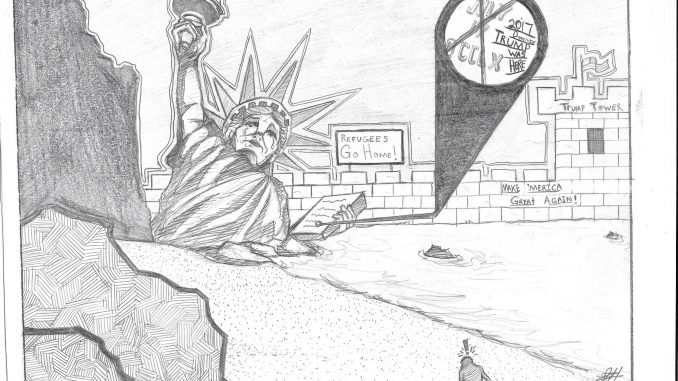
Only one week into his term in office, President Donald Trump signed Executive Order 13769, colloquially known as the “Muslim travel ban.” The order suspended refugee admissions for 120 days and the entry of all travelers from Iraq, Iran, Libya, Somalia, Sudan, Syria and Yemen for 90 days. The latter provision was eventually modified to exempt green card holders from the ban.
This order should come as no surprise to anyone who followed President Trump’s campaign over the last 18 months. In December of 2015, Trump proposed a “total and complete shutdown of Muslims entering the United States until our country’s representatives can figure out what is going on.”
We at The New Paltz Oracle condemn this travel ban due to its ethical shortcomings and logistical problems. We recognize and respect the need to protect our borders. However, banning a demographic of people based upon the religion of their country of origin is antithetical to the American idealism for which we strive to achieve.
The ban on Syrian refugees is unnecessary given how extreme the vetting process already is. According to TIME, the average refugee undergoes 18 to 24 months of intense vetting that involves “in-depth refugee interviews, home country reference checks and biological screening such as iris scans.”
By the end of the process, a given refugee will have been through multiple databases across multiple national and international agencies. The idea that anyone can simply slip through our borders with ease by posing as a refugee has no basis in reality. In fact, not only has there never been a fatal terrorist attack on the U.S. at the hands of a Syrian refugee, but there hasn’t been one at the hands of any refugee, period.
Furthermore, President Trump’s proposition was far too vague to manifest as practical policy. It’s clear that there was no plan for which of the world’s 1.6 billion Muslims would be barred, and no strategy for or understanding of what is “going on.”
Not a single person from any of those seven countries mentioned has been involved in a deadly terror attack on U.S. soil in 40 years, according to the CATO Institute. The list of countries was based on an amendment to the Visa Waiver Program signed by President Barack Obama. The Visa Waiver Program permitted citizens from 38 nations to travel to the United States and remain without a visa for up to 90 days; the amendment removed program eligibility for dual citizens if one of the citizenships was from one of the seven countries.
A majority of the 9/11 hijackers hailed from Saudi Arabia. Their leader, Mohammed Atta, was from Egypt. Ever since the discovery of Osama Bin Laden in Pakistan, the United States has had strained relations with the nation. None of those three countries appear on the list.
Within the next few days, the United States Court of Appeals for the Ninth Circuit will come to a decision in regards to reinstating the ban. However, it is expected that this decision will inevitably make its way to the United States Supreme Court. According to prominent national legal analysts, the eight-Justice court could very well find itself in a 4-4 tie that would leave the appeals court’s ruling in place.
Trump has found many of his executive orders met with contention from federal judges, and, in the case of his proposed ban, lashed out against those justices in response. The contentious legal battle over his order displays the determination of those who disagree with him. It is now the responsibility of the opposition to ensure that the precedent being set by the Trump administration is not one of exclusion toward innocent people from these countries and indifference towards persecuted refugees.
